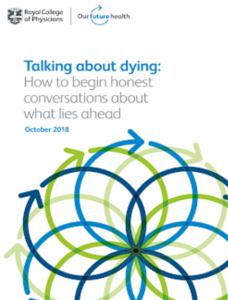Recently the Royal College of Physicians (RCP), in a widely reported statement, called for doctors to start talking about death earlier. It followed from a report, “Talking about Dying”, which found only 4% of patients talk to their doctors about dying or benefit from advanced care planning.

“Too many patients are being admitted to hospital without ever having discussed serious issues like DNACPR (do not attempt cardiopulmonary resuscitation) or their ceiling of treatment despite chronic, life-limiting conditions and frailty. We act on default because we don’t know what the patient wants.” – Medical Registrar cited in the report
Stating that open dialogues, although sometimes “challenging”, were essential to good medical practice the RCP identified three barriers to end of life conversations: culture, confidence and practicalities.
On culture, the RCP found a systematic gap between patient’s expectations and clinical practice. In particular, they found whilst 77% of patients would prefer being told if they had less than a year to live, a majority of doctors preferred not discussing the topic. The report also found that “death [is widely viewed] as a failure” amongst the medical community, and a culture exists which prevents patients from discussing the acceptable limits to treatment. Indeed the report found many doctors believe their role is to “cure all ailments”, thus meaning that they believe they should always “do something to help [even if it resulted] in unnecessary aggressive treatment”.
On confidence, the report found that at all levels doctors feel unprepared to talk about dying. Specifically, the RCP found that junior doctors feel most unprepared, because they often lack opportunities to practice end of life conversations and consequently feel worried about initiating them.
Finally, on practicality, the report found most doctors were unclear at what stage conversations should begin. Additionally, doctors were unclear which healthcare professionals should be responsible for conducting end of life conversations. Indeed, many staff admitted “they were reluctant to start conversations … if they could not finish them … themselves”.

“There could be a whole population of people who, even at 60 years, may not want resuscitation. If we don’t ask them, they’ll just get it. This should be a routine conversation with every single person.” – Trainee Doctor cited in the report
The RCP report stated that these barriers were a serious concern, because doctors “need to be equipped to offer patients honest conversations about what they can expect in the future, [and] to give [patients] choice and control over the remainder of their days”. Their report highlighted five main benefits to open conversation about death:
- Early planning often improves a patient’s quality of life and mood
- Early planning often reduces the need for aggressive treatment later
- Early planning improves a doctor’s ability to deliver a patient’s wishes
- Early planning often enables better pain relief for a patient
- Early planning can in some cases extend a patient’s life
Consequently, the RCP recommended a raft of proposals to improve the dialogue between doctors and patients. For example, they recommended better training for undergraduates, a public awareness campaign and a better understanding of an end of life conversation’s purpose. The RCP stressed, that conversations should not be considered singular events, but rather understood as a continuing process of “encouraging a patient to think about their preferences”. Interestingly, the Royal College also suggested conversations should not begin in the last phases of someones life, but could and should begin at any point.
MDMD strongly endorse these conclusions. We promote these discussions with medical professionals both as part of possibly refusing medication and as part of end of life planning using advance decisions to refuse treatment, advance statements of wishes to guide “best interests” decisions, and lasting powers of attorney for health and welfare. We also strongly encourage discussion with family and close friends. These discussions can help both the person whose life will soon end, and those who they will leave behind.
In the light of this report, and the excellent book “Being Mortal” by Atul Gawande, which touches on similar topics and the over-medicalisation of our care for the elderly, perhaps the medical professions should get initial conversations started long in advance of any serious illness, during routine medical check-ups in people’s 60’s and 70’s?
Two factors indicate that “Talking about Dying” may signal a subtle shift in the Royal College of Physicians in this direction.
1) Good End of Life Planning “is not just about high quality palliative care in the last weeks or days”.
Throughout the RCP’s report palliative care examples were heavily drawn upon to evidence their claims. Indeed, the report even went so far as to ultimately conclude that physicians find end of life conversations difficult, because “there are not enough palliative care specialists”.
Despite this, “Talking about Dying ” is important, because it signals that the Royal College of Physicians may be moving away from a simple insistence that good palliative care is all that is required.
My Death, My Decision welcomes this movement. Palliative care is an important end of life choice, and it brings relief to a very large number of suffering individuals. However, it is important to acknowledge that for all its benefits, palliative care is not sufficient for everyone, in all situations. Palliative care is principally a pain oriented form of treatment. Thus, it is limited in the extent it can help individuals who fear a loss of dignity and autonomy. Without the option of an assisted death, should they eventually need it, some people quite understandably fear that their end of life will be intolerable for them. This fear alone can prevent them having a good death.
We believe that palliative care and assisted dying are neither alternatives nor antagonistic options. Experience in parts of Belgium has demonstrated, for over a decade, that the two can work in tandem. My Death, My Decision would encourage any future change in the law to adopt a similarly integrated approach.

2) Doctors are uncomfortable with diagnosis of less than 12 months to live
Another interesting aspect of “Talking about Dying”, was the Royal College’s frank admission that “Professionals are often reluctant to initiate conversations about the end of life because they are not sure that the patient will die within the next 12 months”.
MDMD fully understands that it is impossible for doctors to make accurate predictions on life expectancy. They should not be expected to do so, not in relation to when to start conversations about end of life treatment, nor in relation to eligibility for welfare benefits, nor in decisions as to whether someone might be eligible for an assisted death. Patients and legislators need to accept this too.
Patients wanting to discuss end of life options, should not be refused a conversation merely because an accurate life expectancy assessment is impossible, regardless of any timescale. MDMD believes that those suffering from non-terminal illnesses, such as Locked-in Syndrome or Multiple Systems Atrophy, are entitled to the same conversations and choices as those whose end of life is sooner and more predictable.
The Royal College of Physicians seem to reflect a wider trend of doctors pushing back against a rigid 12-6 months time frame. For example, in Scotland it was recently decided that “terminal illness”, as it applies to the right to certain benefits, is now determined by doctors without any need for an estimate of life expectancy. Further, in Canada the Medical Assistance in Dying law there is applicable to those with a “reasonably foreseeable death”, again with no specified time limit.
An area that “Talking about Dying” doesn’t cover, but should, relates to a patient’s wish for a meaningful conversation about assisted dying. Without this doctors can never have the sort of open, honest “Talking about Dying” conversations which some patients wish for. In this sense the doctor patient relationship is currently broken and needs fixing by giving doctors the freedom and professional protection to:
- discuss options like medically assisted suicide in Switzerland, refusal of food and drink, and rational suicide. Even if they cannot assist in these options.
- provide documentary evidence of the patient’s condition together with medical records. Patients should not fear discussing their well-considered options in case doctors attempt to withhold that essential information as a method of frustrating a patient’s attempts to arrange a medically assisted death abroad.

